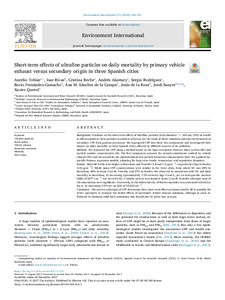Por favor, use este identificador para citar o enlazar este ítem:
http://hdl.handle.net/20.500.11765/11673
Short-term effects of ultrafine particles on daily mortality by primary vehicle exhaust versus secondary origin in three Spanish cities
| Título : | Short-term effects of ultrafine particles on daily mortality by primary vehicle exhaust versus secondary origin in three Spanish cities |
| Autor : | Tobías, Aurelio; Rivas, Ioar; Reche, Cristina; Alastuey, Andrés; Rodríguez González, Sergio


|
| Palabras clave : | Ultrafine particles; Black carbon; Vehicle exhaust; Secondary emissions; Mortality; Time series |
| Fecha de publicación : | 2018 |
| Editor: | Elsevier |
| Citación : | Atmospheric Environment. 2018, 111, p. 144-151 |
| Versión del editor: | https://dx.doi.org/10.1016/j.envint.2017.11.015 |
| Resumen : | Background: Evidence on the short-term effects of ultrafine particles (with diameter < 100 nm, UFP) on health is still inconsistent. New particles in ambient urban air are the result of direct emissions and also the formation of secondary UFP from gaseous precursors. We segregated UFP into these two components and investigated their impact on daily mortality in three Spanish cities affected by different sources of air pollution. Methods: We separated the UFP using a method based on the high correlation between black carbon (BC) and particle number concentration (N). The first component accounts for aerosol constituents emitted by vehicle exhaust (N1) and the second for the photochemical new particle formation enhancements (N2). We applied cityspecific Poisson regression models, adjusting for long-term trends, temperature and population dynamics. Results: Mean BC levels were higher in Barcelona and Tenerife (1.8 and 1.2 μg•m−3, respectively) than in Huelva (0.8 μg•m−3). While mean UFP concentrations were similar in the three cities, from which N1 was 40% in Barcelona, 46% in Santa Cruz de Tenerife, and 27% in Huelva. We observed an association with N1 and daily mortality in Barcelona, by increasing approximately 1.5% between lags 0 and 2, per an interquartile increase (IQR) of 3277 cm−3, but not with N2. A similar pattern was found in Santa Cruz de Tenerife, although none of the associations were significant. Conversely, in the industrial city of Huelva mortality was associated with N2 at lag 0, by increasing 3.9% per an IQR of 12,032•cm−3. Conclusion: The pattern and origin of UFP determines their short-term effect on human health. BC is possibly the better parameter to evaluate the health effects of particulate vehicle exhaust emissions, although in areas influenced by domestic solid fuel combustion this should also be taken into account. |
| Patrocinador: | This study was supported by the National Plan for I+D+I (Project PI15/00515) co-funded by the ISCIII Directorate General for Evaluation and the European Regional Development Fund (FEDER), by the Ministry of Economy, Industry and Competitiveness and FEDER funds (project HOUSE, CGL2016-78594-R) and by the Generalitat de Catalunya (AGAUR 2015 SGR33 and DGQA). |
| URI : | http://hdl.handle.net/20.500.11765/11673 |
| ISSN : | 1352-2310 |
| Colecciones: | Artículos científicos 2015-2018 |
Ficheros en este ítem:
| Fichero | Descripción | Tamaño | Formato | ||
|---|---|---|---|---|---|
| 1-s2.0-S0160412017314... | 534,89 kB | Adobe PDF |  Visualizar/Abrir |
Los ítems de Arcimis están protegidos por una Licencia Creative Commons, salvo que se indique lo contrario.





